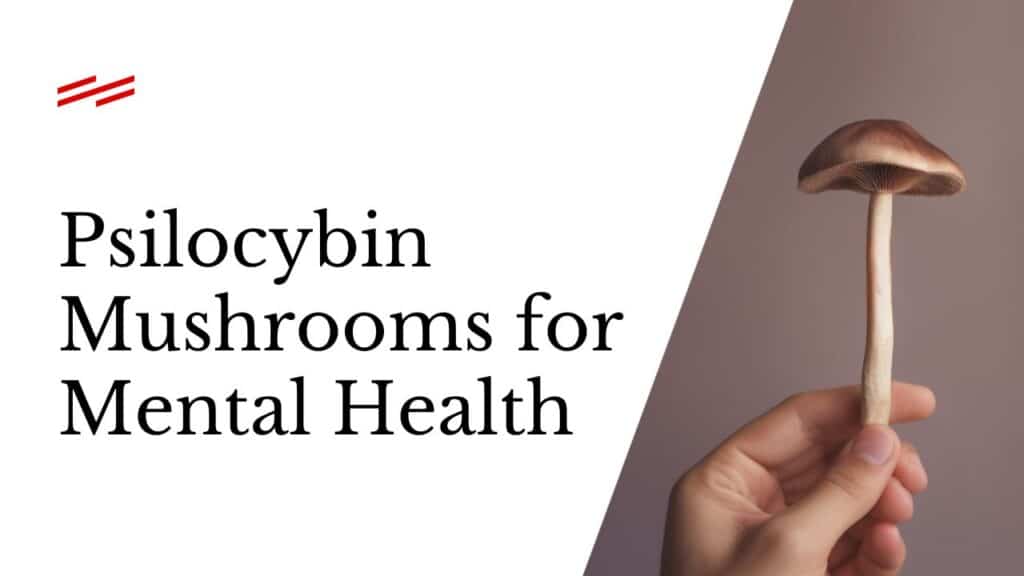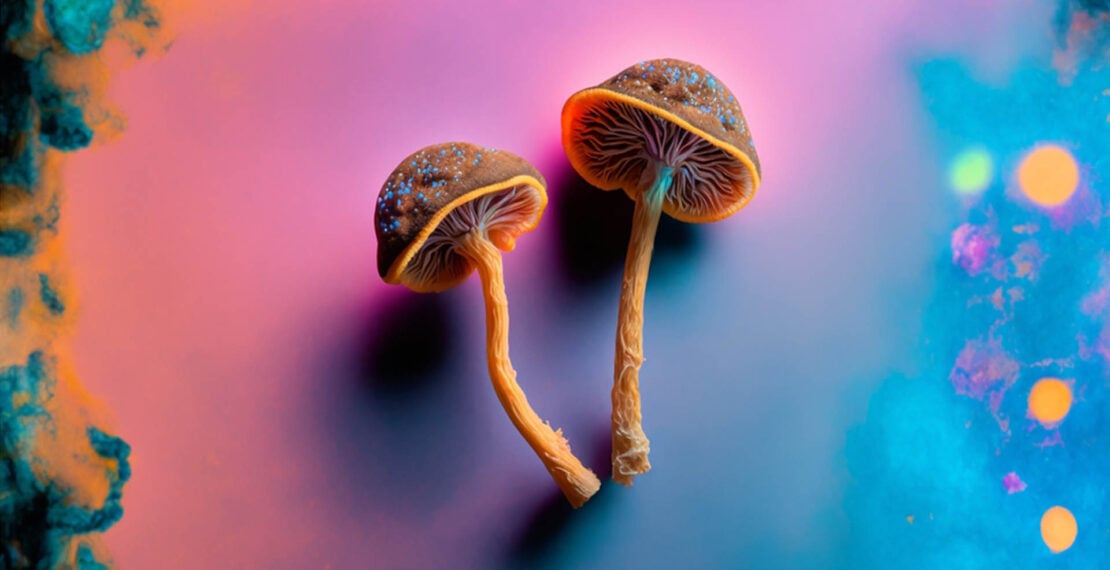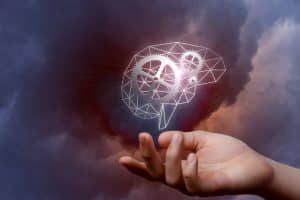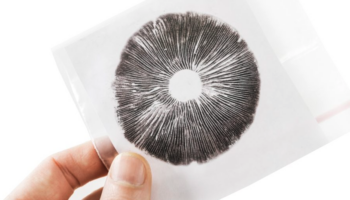
Disclaimer: Psilocybin is a largely illegal substance, and we do not encourage or condone its use where it is against the law. However, we accept that illicit drug use occurs and believe that offering responsible harm reduction information is imperative to keeping people safe. For that reason, this document is designed to enhance the safety of those who decide to use these substances. You can learn more about the legality of Psilocybin cubensis mushrooms here.
Psilocybin–the active ingredient in magic mushrooms–is becoming increasingly recognized for its capacity to aid emotional healing and well-being.
In the video above, watch Third Wave CEO, Paul F. Austin, describes how to optimize healing with mushrooms to help combat various mental health issues, including anxiety, severe depression, and PTSD. Read on to explore the science and research behind psilocybin and mental health and how to use psilocybin mushrooms for your own healing journey.
Psychedelics and Mental Health
Since the 1950s, scientists have recognized the healing potential of psychedelic medicines. Yet, with a decades-long stigma since President Richard Nixon declared a “war on drugs,” it’s only in recent years they have become more generally acknowledged for medical use and as therapeutic tools.
The word psychedelic means “mind-manifesting,” which describes how hallucinogenic substances can help reveal parts of our subconscious. This property makes psychedelics valuable tools in psychotherapy and mental health, as it allows repressed memories and difficult emotions to be brought to the surface. When combined with talk therapy and integration, this effect can help us better understand why we think and behave the way we do.
Paul F. Austin shares how psychedelic mushrooms, for example, “ …open up the aperture of existence which allows the issues that need to be resolved to come to the surface. When these challenges arise, the patterns of why we do what we do become much clearer.”
As well as giving insight into the subconscious, psychedelic therapy benefits mental health by helping us gain new perspectives and change unhealthy thoughts and behaviors.
In a recent Third Wave podcast episode, integrative psychotherapist Keith Kurlander explained:
“So, we’re perceiving things in a repeated pattern for either weeks, months, or years, or your whole life…. And generally speaking, that perception of life has a lot of falsehoods in it…. I think, generally speaking, psychedelics give you a moment where, now, you have to look at [life] completely differently.”
When looking at the neuroscience of classical psychedelics (psilocybin, DMT, and LSD), psychopharmacology research explains that increased flexibility in the brain may explain people’s profound ability to change.
Research has demonstrated that psychedelic medicines interact with a protein called the 5-HT2A receptor, which usually responds to the chemical messenger serotonin. In turn, 5-HT2A activates a molecule called brain-derived neurotrophic factor (BDNF), which increases the capacity for nerve cells to grow and form novel connections, which translates into new patterns of behavior and thinking.
This mechanism is crucial when considering psychedelics and mental health since many mental health disorders are characterized by patterns “stuck” in the brain, manifesting as rigid and unhealthy habits. Psychedelics can offer a window to help overcome these rigid tendencies.
Psilocybin and Mental Health Research

Over recent years, a wealth of clinical trials have demonstrated the therapeutic effects of psychedelics–particularly psilocybin–on patients with mental health diagnoses.
One of the leading facilities in this field of research is the Johns Hopkins University Center for Psychedelic & Consciousness Research, founded by Professor Roland Griffiths, Ph.D., in 2019.
Nine years earlier, Johns Hopkins became the first organization to gain approval from the Food and Drug Administration (FDA) to study psychedelics, specifically psilocybin-assisted therapy, since the 1970s. In 2021, it became the first psychedelic research institution to receive funding from the National Institute of Health since the 1960s.
With multiple studies finding psilocybin to be more effective than conventional antidepressants, psilocybin has been approved as a Breakthrough Therapy for both Treatment-Resistant Depression (TRD) and Major Depressive Disorder (MDD) by the FDA.
In November 2022, the mental health company COMPASS Pathways released results from their randomized, double-blind phase 2b study, the largest study to date of psilocybin for TRD. Their results found a single dose of psilocybin gave rise to significant reductions in depressive symptoms compared to the control group who took a placebo. In addition, the patients treated with the high dose (25 milligrams) had a sustained antidepressant response at the twelve-week follow-up.
The therapeutic effects of psilocybin have been clinically researched for several other mental health conditions over recent years. New studies include psilocybin for obsessive-compulsive disorder (OCD) and anorexia nervosa from Imperial College London and anorexia nervosa from New York University.
Using Magic Mushrooms for Healing

Although most psilocybin research has focused on using the therapy in a psychiatric context, the mental health benefits of psychedelics aren’t limited to people with a clinical diagnosis.
By helping us confront traumas, gain insight, and change unwanted habits, psilocybin can greatly improve everyday well-being. It’s also important to recognize these medicines aren’t for everyone, especially people with a diagnosis or family history of psychosis.
Although the benefits of psychedelics in mental health aren’t limited to psilocybin, we personally believe in this medicine because:
- Psilocybin is the most researched psychedelic for use in psychedelic-assisted therapy.
- Studies find psilocybin to be well tolerated with few side effects.
- Across the US, psilocybin legislation is beginning to change, making it more legally accessible than other psychedelics.
- It is easy to grow psilocybin mushrooms at home. (You can learn how by checking out our high-quality mushroom grow kit, which comes with a comprehensive step-by-step growing guide.).
Before you consider sourcing or growing these mushrooms, check your area’s regulations on psilocybin and magic mushrooms to make sure what you’re doing is legal.
You can learn more about the specific therapeutic effects of other classic and non-classic psychedelics, such as MDMA and cannabis, by checking out our psychedelic substances guide.
Microdosing or Macrodosing?

While most studies looking at psilocybin and mental health have used large doses, qualitative studies and anecdotal reports show microdosing can also benefit mental health. Which approach is best?
When it comes to healing, the main difference between microdosing and macrodosing is that microdosing tends to be more subtle, with effects that accumulate over time. In contrast, macrodosing involves one or two powerful experiences, often including sensory hallucinations.
Since microdosing effects are very mild or sub-perceptual, generally speaking, you don’t risk having a “bad trip,” unlike macrodosing. For this reason, if you’re new to psychedelics or particularly sensitive, microdosing may be better suited to you.
You can learn more about the practicalities of microdosing psilocybin, such as dosing and other protocols, as well as personalized, in-depth guidance on how to make the most of your microdosing journey, by checking out Third Wave’s microdosing course.
On the other hand, if you’re interested in exploring different realms of consciousness and perception, you may want to macrodose.
With large doses of psilocybin, people can also have mystical experiences characterized by a loss of sense of self and feelings of unity with the universe. Some research suggest having these experiences can increase the likelihood of long-lasting positive effects.
Preparing, Navigating, and Integrating Your Psilocybin Experience

Preparation
Psilocybin is a non-specific amplifier, meaning its effects can be unpredictable. For this reason, it’s essential to have a clear intention when working with the medicine.
You can help create an intention by asking questions like:
- Do I have particular thoughts and behavior patterns I’d like to change?
- Is there a specific trauma I’m looking to heal?
- What things in life are blocking me from achieving my goals?
- Do I have unresolved conflicts I’d like to work through?
In the weeks leading up to your journey, be sure to journal and keep track of any emotional shifts or insights that may arise following your intention-setting since bringing awareness to these issues can also bring about psychological changes.
You also want to think about your set and setting as well as your intention.
Regarding the setting or physical environment, for large doses, it’s particularly important to be in a place where you feel safe and comfortable. Tidy the space beforehand to help bring mental clarity. You may also choose to wear an eye mask to eliminate visual distractions so you can go deeper into the experience.
As for set or your emotional state, there are many things you can do to help amplify your well-being leading up to and during your psilocybin journey, such as:
- Meditation
- Yoga
- Exercise
- Eating healthy foods
- Meeting up with and making phone calls with friends
- Walking in nature
As part of your preparation, you will also want to consider whether you will have someone guide your journey, which you can learn more about below.
For large-dose experiences, if you’re choosing not to work with a guide, it’s essential to have a trip-sitter. When considering who you may ask to trip-sit, ensure this is somebody you feel comfortable around and preferably has psychedelics experience.
Navigating the Experience
When thinking about the therapeutic use of psilocybin, one framework you may choose to help navigate your experience is the Accept-Connect-Embody model (ACE), developed by Dr. Rosalind Watts from Imperial College London and successfully used in the institution’s psilocybin-for-depression trials.
The ACE model’s three core principles are:
- Acceptance: Accepting any challenging emotions and thoughts which may arise during the psychedelic journey, seeing them as opportunities to learn and understand where they may come from.
- Connection: Feeling into any sense of increased connection, which could be with other people in your life, the natural world, or a deeper sense of self.
- Embodiment: Paying attention to the body during the experience to see if any physical areas are associated with particular emotions. You can also use attention to the body and breath during challenges as a way to ground.
It helps if you carry your healing intention into the experience. To do this, you could frame your intention as a short sentence or mantra, and repeat it mentally to stay focused on your goal and help move through difficulties.
Integration
Integration is crucial to bringing insights from your psilocybin journey into your everyday life, alchemizing the experience into grounded, lasting change.
Integration involves three key steps:
- First, take stock of what the experience has revealed to you.
- Secondly, consider how you’d like to change your life based on these insights.
- Finally, create and carry out small steps and actions to ground new behaviors and ways of thinking into your everyday life.
To help establish these insights and lessons from your psilocybin experience, you can try journaling, meditation, and speaking to friends and family.
It’s also vital to keep journaling and contemplating in the weeks following your experience. This will help you bring awareness of whether you feel any differently or if any shifts have occurred following the journey.
Working with a Coach or Therapist

Working with a trained professional can help guide your psilocybin journey to enhance mental health benefits.
Generally speaking, coaches have a wider variety of training backgrounds than therapists. Their role is to support clients throughout a transformational journey by, for instance:
- Helping set and track goals
- Assisting with practical matters such as dosages
- Creating action plans based on insights
On the other hand, therapists will be professionally trained in mental health care, including psychiatry, psychotherapy, and counseling.
A therapist may be better suited than a guide if you have a mental health diagnosis or are working with considerable trauma. Specialist integration therapists can also help people resolve and make sense of difficult psychedelic experiences.
Because of legal restrictions, most coaches and therapists offer help in preparing and integrating psychedelic experiences rather than guiding a psilocybin session. However, this will soon change in Oregon and Colorado, where state governments have passed legislative measures allowing for legal psilocybin treatment.
For those wanting a guided experience while macrodosing, your best options are:
- Participating in a psilocybin research study.
- Visiting a country where psilocybin is legal and participating in a psilocybin ceremony, retreat, or facilitated experience at a specialist clinic. (You must ensure the clinicians are legitimate and you can trust the guides.)
- Consider ketamine-assisted therapy as a legal alternative, especially if you’re dealing with a mental illness. You will benefit most from the guidance of a mental health professional during the altered-state experience.
If you’d like to work with a trained professional during your psilocybin journey, go to our directory to find a trusted therapist or coach in your area or who works online. You will also find legal and legitimate retreats and clinics offering healing psilocybin experiences and other psychedelic treatments.
Psilocybin and Healing: Final Thoughts
The field of psilocybin and mental health research is growing rapidly, and as more research comes to light, psilocybin therapies may become mainstream.
However, it’s important to remember that not all psychedelic experiences will be positive, so it’s important to prepare for, navigate, and integrate your experiences with a clear intention.
If you live in a region that permits cultivation for personal use, consider growing your own psilocybin mushrooms with Third Wave’s Mushroom Grow Kit and course.









I had two very healing experiences in the 90s with mushrooms I gathered in a field growing in cow manure. The first experience, with a medium amount made into tea, gave me real insight into how my life is controlled by excessive fear. The second experience a week later, with a larger amount, alone in a beautiful wooded area, caused me to see into another realm, and as it got dark, beautiful neon colored spirit serpent beings came to me. I could see them in my mind’s eye after sundown. I was expecting repressed memories to come, as I have PTSD since childhood. But instead healing and cleansing of the doors of perception came in an amazingly beautiful way. I use the meditative state of just being there and letting yourself be guided from within from that state… it can really help to reduce fear and be there without being in the way of what needs to happen. I had had several years of healing crying spells coming from meditation before these mushroom experiences. I had wondered if I should do more trips in the years that followed and felt no. A hippie-era gent then told me once, “You get all you need from psychedelics from that first good strong trip you take.” I agree. Once or twice and then move on. As the scientist who discovered LSD said, in the ancient world you only made that trip once. Had the hippies of the 60s known this, this world would be very different today. That’s my testimony.